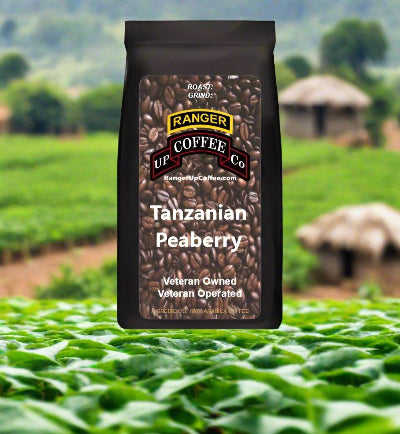Tanzanian Peaberry Coffee
- 40 in stock
Description
Tanzanian Peaberry Coffee
Tanzanian Peaberry is grown in the high-altitude regions of the country, most famously on the slopes of Mount Kilimanjaro, whose rainfall and fertile, volcanic soil produce the perfect growing conditions for Arabica coffee. Not as well-known as its East African neighbors Ethiopia and Kenya, Tanzania has been cultivating coffee for hundreds of years, though it is only in the past few decades that it has been recognized as a unique presence on the international scene.
A Brief History of Tanzanian Coffee:
Tanzanian coffee was something of a well-guarded secret for a long time. The Haya tribe in northwest Tanzania were the first to cultivate coffee in the 16th century. The Haya coffee, or amwani, was originally a unique variety of Robusta, grown in the shade of banana trees, and prepared by boiling unripened coffee cherries with various local herbs herbs and smoking them for days. The end-product was not brewed with hot water and drunk out of a cup but chewed as a stimulant. It was also used as currency in business transactions, greetings, royal tributes, and religious rituals. Coffee was so highly-valued among the Haya that only the king could authorize its planting and cultivation, and the locations it could be grown in were severely limited by his decree. In this way, coffee was equated with wealth in Haya society but unknown internationally.
In the late 19th century, East Africa came under German colonial rule, and coffee was made into a cash crop and exported overseas for the first time. After the First World War, Tanzania became a holding of the British Empire, which attempted to create a more efficient system of coffee production. This lead to the formation of many coffee cooperatives, including the Kilimanjaro Native Coffee Union, Africa’s oldest coffee cooperative, which formed in 1925 and is still around today. But it was not until in the 1990s, several decades after independence from Europe, that Tanzanian coffee became internationally renowned. Today, coffee is Tanzania’s largest export crop, and contributes $115 million to the economy every year. The Haya are still the primary growers of the coffee. Coffee remains the single biggest source of income for the majority of Haya households, and around 90% of Tanzanian coffee is grown by smallholders, rather than big plantations.
What is a Peaberry?
Tanzania is famous on the international coffee bean market for its separated-out peaberry lots. So, what exactly is a peaberry? And how does it affect your coffee drinking experience?
A normal gourmet coffee fruit or “cherry” contains two beans, which are flat on the interior and round on the outer side. But every once and a while (in 5-10% of all coffee cherries) the plant will fail to fertilize one of the beans, and a single bean will develop. Without a second bean to impede its growth and flatten it, what gets produced is a perfectly round coffee bean called a peaberry.
The peaberry is denser than a normal arabica coffee bean, and this density gives it a special smooth texture when brewed. The shape of the peaberries also affects the roasting process. Their round shape allows them to roll around the chamber and roast more evenly than flat beans, which can become darker on one side than the other. Peaberries also require a slower roast, which affects the flavor. It is speculated that the peaberry has a distinctive flavor because it did not have share the cherry with another bean, and therefore received twice as many nutrients as a normal bean.
Peaberries are naturally-occurring variations in every coffee crop. You can find peaberries in Brazilian or Kenyan arabica coffee. The Tanzanian mills just happen to specialize in peaberry lots. It’s sort of their niche. Since there is no way of telling which cherries contain peaberries, and which do not, peaberries must be hand-sorted and picked separately. This is a painstaking and slow process, and the labor time that goes into it explains why a bag of peaberry coffee can be a little pricier than normal from your coffee supplier.
Flavor Profile:
Tanzanian Peaberry coffee is complex, with a bright acidity, a medium body, and a unique smooth texture. Citrus flavors like lemon, as well as notes of blackberry, tea, and soft pipe tobacco can be detected.
There’s a debate among the experts about whether the peaberry adds that much to the actual flavor of the brew. Some passionately claim that it does, calling it the “champagne of coffee.” Others say that it changes the body, but not the flavor. It’s an open question, so why not buy some Tanzanian Peaberry at wholesale prices in bulk and weigh in yourself!
Tanzanian Peaberry is a premium blend from high grown estates in Southern Tanzania (Lunji, Utengule, and Kanji Lanji Estates) and Northern Tanzania (Mondul, Burka, Ngila, and Lyamungu Estates).
Southern Estates
The Southern Estates are located in Mbozi and Mbeya, in the southern highlands of Tanzania. Although total production is usually less than 500 metric tons, the coffee from Utengule, Lunji and Kanji Lalji estates has a very good reputation. The Utengule coffee estate is a traditional, well-managed East African Coffee farm that produces an exquisite Arabica coffee. There is a large variety of rare trees and flowers growing on the farm as well as several rivers. By walking through the 500 acre coffee estate you can explore how coffee is being grown, harvested, and processed.
Mondul Estate
This farm was developed by Count Vottorio Davico di Quittengo in 1931 after a careful inspection of the fertile and uninhabited areas on the slopes of the Mondul mountains in Northern Tanganyika. He fell in love with East Africa after working briefly for the Central Africa Exploration Company in Uganda. After convincing his family in Italy to assist him in the purchase of the land, the Mondul Coffee Estate was founded. Count Davico died in 1983 and was buried at Mondul on the highest hill overlooking the estate. His two sons are now running the estate with the same entrepreneurial spirit and social commitment of their father. It has a total production of 1400kg/ha.
Burka Estate
This farm was established in 1899 by German settlers and has continued as a coffee producing farm. The estate covers an area of 1500 acres with an annual production of 1000 metric tons. The estate is also home to the Arusha Coffee Lodge, which has coffee plantation tours, horseback riding, mountain biking, and nature trails.
Ngila Estate
This estate is situated in the Karatu District on the slopes of the Ngorongoro crater and is surrounded by the Ngila Forest reserve. It was founded in the 20th century by a German family and later taken over by British farmers after the WWII, who sold it to Ruldolf Meyer in 1990.
Lyamungu Estate
Lyamungu is located on the southern foothills of Mt. Kilimanjaro, approximately 15km from the Moshi/Arusha main highway. It was established in 1934 as a center for coffee research in Tanzania and is now leased to Mufindi Tea Company.
Cup Characteristics
black tea notes, chocolate notes, blackberry notes, kiwi notes, lemony acidity, sweet, balanced, complex
Couldn't load pickup availability

Do you ship to my country?
We only ship within the United States. This ensures that our coffee is fresh when you receive it.
What's so special about your K-Cups?
99% of coffee roasters use old coffee to fill K-Cups. The reason is the pod is sealed so no gasses can escape and would explode. Our K-cups are able to release gasses so we can roast your order and immediatly fill the pods.
How long to roast & ship my order?
All orders received prior to 1700CST (5pm Central) are roasted that evening and shipped early the next morning. The exception is any day that the next day is not a shipping day ie; Holidays, Sundays etc.
Do you donate to charity?
Every tip, donation and 10% of our profits are donated to Veteran Homeless charities like Tunnels to Towers Homeless Veteran Program.


